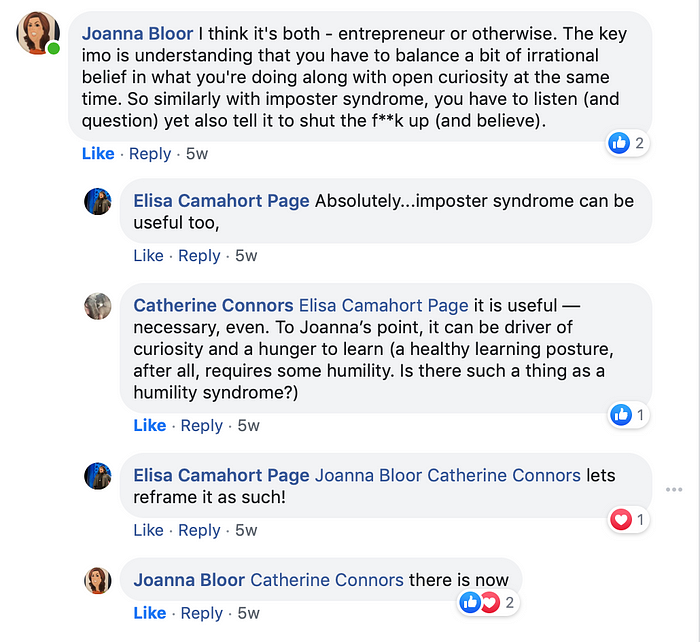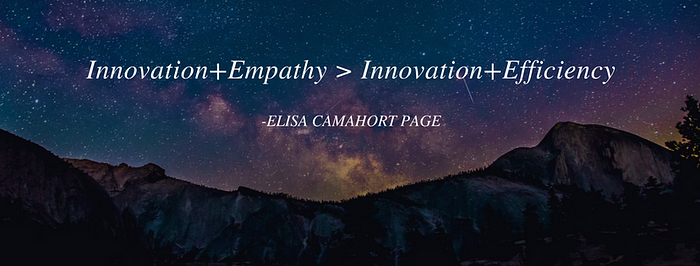Is it time to re-frame “Imposter Syndrome?” The value of “Humility Syndrome.”
I speak a lot, with both individuals and groups, about the power in knowing (and owning out loud) your own value and being able to articulate your expertise and what makes you not necessarily unique, but definitely special.
In that context the topic of Imposter Syndrome has often arisen, and one thing I’ve noticed is that even though Imposter Syndrome afflicts people across the board, it is becoming increasingly gendered in public discussions.
Imposter Syndrome, defined by me as the feeling that you don’t belong in the ”room where it happens,” that you will inevitably be found out, that you are heavier on the faking it than making it, is a common enough issue that I have programmed sessions about it at conferences for more than a decade. I’ve also programmed it at events that are not as gendered as BlogHer events obviously were…last year’s How I Built This Summit for NPR as the most recent example.
But these days I most regularly see Imposter Syndrome discussed in a gendered context as one more thing that women have to “overcome” in order to get the success they deserve. It’s a kind of corollary to advice to lean in. DO lean in. DON’T let yourself be stopped by Imposter Syndrome.
I have two problems with this:
As mentioned, Imposter Syndrome is experienced by men and women. It’s only how we’re socialized to recognize, label, and address it that seems different.
But what I’d like to dig into even more than this basic issue about how we try to fix women, not systems, is the fact that there is actually value in the first stages of Imposter Syndrome. A value that is not being given its due, possibly because of its association with women and their approach.
Back in October I listened to one of those personal development podcasts, one that is geared towards entrepreneurs. As I shared on Facebook immediately after listening:
“Made the mistake of listening to a super personal development-y podcast this morning…geared towards the entrepreneurial mythology. With a bit of The Secret thrown in. As in one shouldn’t hope, one should be certain. One must have an iron-clad belief that what they’re gunning for will happen. That every successful entrepreneur BELIEVES.
If that were the case why would “imposter syndrome” even be a thing?
Just as courage is doing something DESPITE fear, not without fear, I think success comes when we strive DESPITE uncertainty and imposter syndrome and barriers, and it most certainly is more likely to come if we acknowledge barriers and strategize about how to deal with them, and not just blindly believe that all that matters is our level of certainty.
And yes, I get it, the host wasn’t literally saying one’s certainty is ALL that matters…obviously hard work, “hustle” (that hated word), learning, etc. matter, but I object to even saying that lack of certainty is a surefire path to failure.
Feh. That’s what I have to say about it.”
And then this exchange with Joanna Bloor and Catherine Connors happened:

To which I say YES. Let’s bring some humility back into the entire process of building and growing a company, community, platform, team, etc. Humility means questioning yourself, listening to others, being willing to learn no matter how far down the path you are, knowing you can’t, really shouldn’t, have all the answers.
When I think back on how and when social media started to change. it’s no coincidence to me that the earliest platforms for online community had women sharing leadership…Blogger, Six Apart, Flickr, all founded by a couple. Compare that to Twitter, Facebook, YouTube, all founded by only men.
It’s not that online harassment or uncivil discourse or destructive choices to support a business model never happened before. But what I do know is that people tried hard to highlight the problems they were experiencing on the latter set of platforms. Women tried for SURE. And the leaders did not take it seriously, did not take steps to solve it, and after enough time threw up their hands at the idea of solving it.
They only believed, unquestioningly, in their own vision and their own experience.
It’s especially hard for me to understand how this kind of cultural rigidity happens within environments that buy into agile and lean product development approaches…approaches which are based on iterating on imperfect solutions to get closer to where you want to be.
It’s such a disconnect.
Can Humility Syndrome cross the line into a more self-defeating cousin, actual Imposter Syndrome? Sure. I’m always telling especially women to just lower the bar, ask less of themselves, put themselves out there even if they feel like they’re not 100% qualified or ready…consider themselves minimum viable products that won’t improve unless they iterate on themselves with external feedback, not just the voices in our heads.
But it’s well past time we place value on the ability to doubt, question, double-check, and achieve the kind of certainty that comes from research and listening and experimentation and diverse voices in the room, not just belief.
I’d rather reward humility than arrogance. And as I’m so fond of saying:








